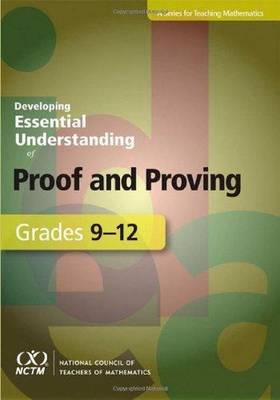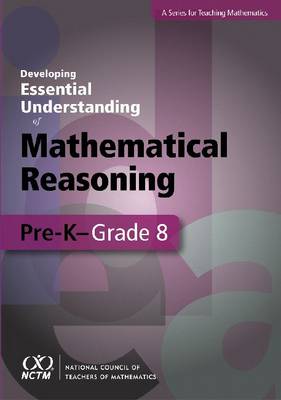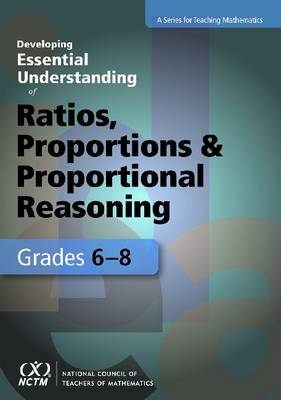Developing Essential Understanding
3 total works
Developing Essential Understanding of Proof and Proving for Teaching Mathematics in Grades 9-12
by Kristen Bieda, Eric Knuth, and Amy Ellis
Published 1 August 2012
What is the difference between "proof" in mathematics and "proof" in science or a court of law? In mathematics, how does proof differ from other types of arguments? What forms can proof take besides the traditional two-column style? What activities constitute the process of proving? What roles do examples play in proving? Can examples ever prove a conjecture? Why does a single counterexample refute a conjecture?
How much do you know...and how much do you need to know?
Helping your students develop a robust understanding of mathematical proof and proving requires that you understand this aspect of mathematics deeply. But what does that mean?
This book focuses on essential knowledge for teachers about proof and the process of proving. It is organised around five big ideas, supported by multiple smaller, interconnected ideas-essential understandings. Taking you beyond a simple introduction to proof and the activities involved in proving, the book will broaden and deepen your mathematical understanding of one of the most challenging topics for students...and teachers. It will help you engage your students, anticipate their perplexities, avoid pitfalls, and dispel misconceptions. You will also learn to develop appropriate tasks, techniques, and tools for assessing students' understanding of the topic.
Focus on the ideas that you need to understand thoroughly to teach confidently.
How much do you know...and how much do you need to know?
Helping your students develop a robust understanding of mathematical proof and proving requires that you understand this aspect of mathematics deeply. But what does that mean?
This book focuses on essential knowledge for teachers about proof and the process of proving. It is organised around five big ideas, supported by multiple smaller, interconnected ideas-essential understandings. Taking you beyond a simple introduction to proof and the activities involved in proving, the book will broaden and deepen your mathematical understanding of one of the most challenging topics for students...and teachers. It will help you engage your students, anticipate their perplexities, avoid pitfalls, and dispel misconceptions. You will also learn to develop appropriate tasks, techniques, and tools for assessing students' understanding of the topic.
Focus on the ideas that you need to understand thoroughly to teach confidently.
Developing Essential Understanding - Mathematical Reasoning in Grades Pre-K- Grade 8
by John Lannin, Amy Ellis, Rebekah Elliott, and Rose Mary Zbiek
Published 23 January 2012
How do your students determine whether a mathematical statement is true? Do they rely on a teacher, a textbook or various examples? How can you encourage them to connect examples, extend their ideas to new situations that they have not yet considered and reason more generally?
How much do you know...and how much do you need to know?
Helping your students develop a robust understanding of mathematical reasoning requires that you understand this mathematics deeply. But what does that mean?
This book focuses on essential knowledge for teachers about mathematical reasoning. It is organised around one big idea, supported by multiple smaller, interconnected ideas - essential understandings.Taking you beyond a simple introduction to mathematical reasoning, the book will broaden and deepen your mathematical understanding of one of the most challenging topics for students and teachers. It will help you engage your students, anticipate their perplexities, avoid pitfalls and dispel misconceptions. You will also learn to develop appropriate tasks, techniques and tools for assessing students' understanding of the topic.
Focus on the ideas that you need to understand thoroughly to teach confidently.
How much do you know...and how much do you need to know?
Helping your students develop a robust understanding of mathematical reasoning requires that you understand this mathematics deeply. But what does that mean?
This book focuses on essential knowledge for teachers about mathematical reasoning. It is organised around one big idea, supported by multiple smaller, interconnected ideas - essential understandings.Taking you beyond a simple introduction to mathematical reasoning, the book will broaden and deepen your mathematical understanding of one of the most challenging topics for students and teachers. It will help you engage your students, anticipate their perplexities, avoid pitfalls and dispel misconceptions. You will also learn to develop appropriate tasks, techniques and tools for assessing students' understanding of the topic.
Focus on the ideas that you need to understand thoroughly to teach confidently.
Developing Essential Understanding of Ratios, Proportions, and Proportional Reasoning in Grades 6-8
by Joanne Lobato and Amy Ellis
Published 18 April 2011
How do you refute the erroneous claim that all ratios are fractions? This book goes beyond a simple introduction to ratios, proportions and proportional reasoning. It will help broaden and deepen your mathematical understanding of one of the most challenging topics for students - and teachers - to grasp. It will help you engage your students, anticipate their perplexities, help them avoid pitfalls and dispel misconceptions. You will also learn to develop appropriate tasks, techniques and tools for assessing your students' understanding of the topic.
Essential Understanding series topics include:
Essential Understanding series topics include:
- Number and Numeration for Grades Pre-K-2
- Addition and Subtraction for Grades Pre-K-2
- Geometry for Grades Pre-K-2
- Reasoning and Proof for Grades Pre-K-8
- Multiplication and Division for Grades 3-5
- Rational Numbers for Grades 3-5
- Algebraic Ideas and Readiness for Grades 3-5
- Geometric Shapes and Solids for Grades 3-5
- Ratio, Proportion and Proportionality for Grades 6-8
- Expressions and Equations for Grades 6-8
- Measurement for Grades 6-8
- Data Analysis and Statistics for Grades 6-8
- Function for Grades 9-12
- Geometric Relationships for Grades 9-12
- Reasoning and Proof for Grades 9-12
- Statistics for Grades 9-12


